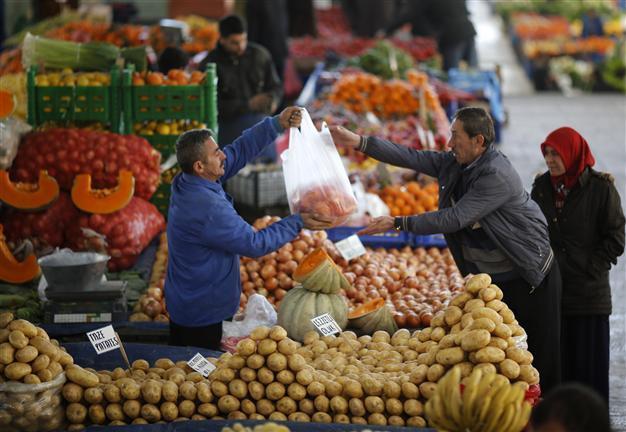Turkish inflation at eight-month high due to high food prices
ISTANBUL

A vendor sells potatoes and other vegetables to a customer in an open market in central Ankara. REUTERS Photo
Turkish inflation rose above expectations in March due to a steep increase in food prices fuelled by drought, according to new figures that disappointed markets that expect the Central Bank to ease its monetary policy.Turkish Statistical Institute (TÜİK) data showed that the consumer price index in March increased by 1.13 percent, making the annual inflation 8.39 percent, the highest level the figure has reached since July 2013.
Core inflation, which represents the long-run trend in price levels, also reached its highest level in seven years, after rising 1.20 percent over the month to hit 9.32 percent over the year.
March’s inflation rise was mainly driven by an above-average surge in food prices.
The consumer price index, which was 1.13 percent for all goods, came in at 2.10 percent for food and non-alcoholic beverages.
High temperatures and a lack of rain have hampered agircultural and caused supply shortage as Western and Central Anatolia experience one of the driest winters in recent years.
Turkish Agricultural Chambers Union (TZOB) President Şemsi Bayraktar has blamed a lack of producers’ organization for the excessive price surge in a statement he released after the announcement of inflation data.
He said producers had not yet been able to achieve stability because of a lack of organization. In some years, farmers have had to sell their products for nothing because of over-supply, while in other years, scarcity in production has negatively impacted consumer prices, he said, urging producers to bring products to consumers at “reasonable” prices.
Weak inflation data also dashed the hopes of markets that had begun to expect relief measures from the Central Bank after it announced it may pay interest on banks’ reserve deposits.
However, the bank have been saying inflation is its main priority in policy making and that it would maintain its tight policy stance until there is a significant improvement in the outlook for inflation, to which it said upward risks remained significant.
Tight policy expectations have also maintained the pressure on foreign exchange currency rates, analysts have said.
In January, the Central Bank revised the inflation midpoint for 2014 up from its previous prediction of 5.3 percent to 6.6 percent as a result of developments in food prices and currency exchange rates, as well as tax rate hikes.
Speaking at a meeting in Kuwait on April 2, Finance Minister Mehmet Şimşek said Turkey’s inflation rate would begin decreasing in the second half of the year.
















